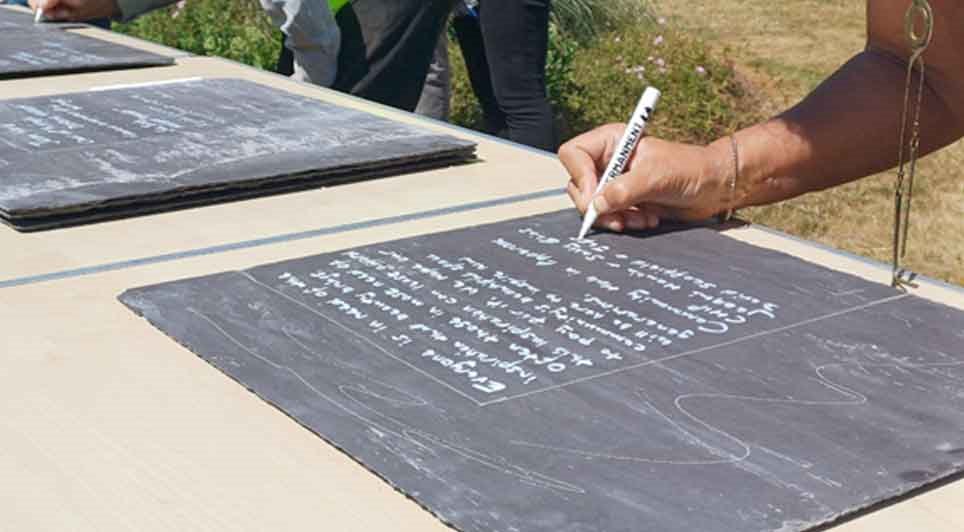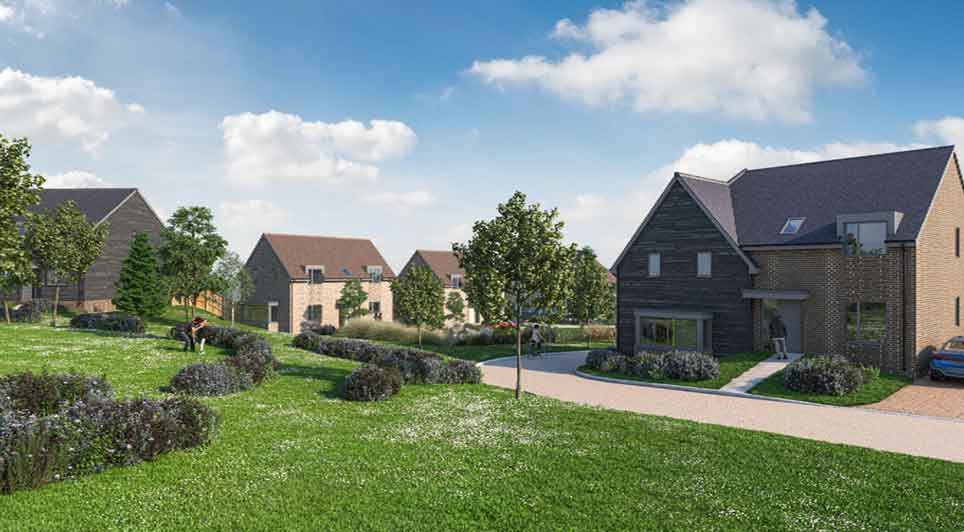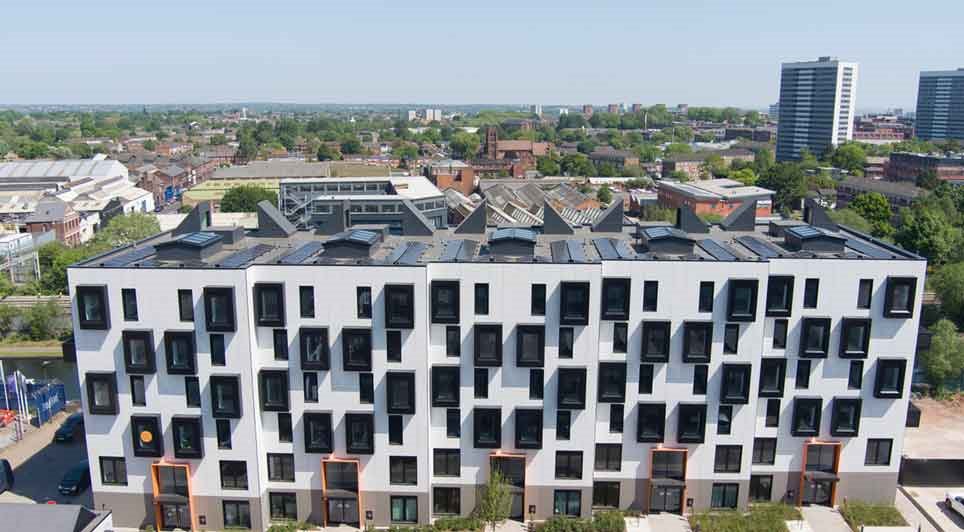The government's drive towards carbon neutral new home construction by 2016 will heighten the profile of emerging renewable technologies within new build domestic developments.
To help satisfy the higher levels of the Code for Sustainable Homes, housing builders and developers are becoming increasingly more aware of the use of ground source heat pumps as a renewable heating system in housing developments across the country.
As the UK’s only manufacturer of a full range of ground source heat pumps, Kensa Engineering has established an unrivalled reputation for providing first class technical support and advice to help clients easily integrate the technology into private and social residential schemes.
Kensa's latest development, the Shoebox Heat Pump, creates a new category of ground source heat pump which will encourage the mainstream adoption of ground source heat pumps as the chosen heating system in residential housing schemes.
The Shoebox Heat Pump which was launched into the market place earlier this month, is a small, extremely quiet, MCS-accredited and British-made ground source heat pump specifically designed to provide both space heating and domestic hot water in new build and retrofit properties where the peak heating load is no greater than 3.5kW.
The unique Shoebox concept ensures a very competitively priced heating and hot water system which allows property developments to be marketed under a ‘green banner’, offering ultra low running costs and minimal carbon emissions for the purchasers or tenants.
In addition, Shoebox installations qualify for significant financial support via Phase One Funding of the Government’s Renewable Heat Incentive (RHI).
The RHI is the world’s first financial incentive scheme designed to increase the uptake of renewable heat technologies and reduce the UK’s carbon emissions. In brief, the scheme provides a subsidy for each kilowatt hour of eligible renewable heat generated from accredited installations, payable on a quarterly basis for a period of 20 years. This is guaranteed and will be inflation linked.
Phase One, primarily intended to support commercial installations but also covering district heating systems in the residential sector, has been launched and is open for business, paying 4.7p per kilowatt hour for ground source heat pump installations (up to 100Kw). Ofgem, the RHI administers, has confirmed that installations featuring communal ground arrays, such as Kensa’s Shoebox Heat Pump, will be deemed district heating systems and therefore eligible for Phase One Funding.
The Shoebox Heat Pump, is a unique product which can be configured into a system architecture that qualifies for Phase One RHI Funding as a district scheme by virtue of the communal ground array.
The use of a communal ground array is a novel means of delivering the ground heat exchanger in a fashion that not only meets the definition of a district heating scheme, but it also permits the use of a slightly smaller and less expensive overall ground array thanks to the concept of diversification.
Diversification simply means it is not necessary to assume that every apartment is simultaneously applying a peak load on the energy source so the ground array can be slightly smaller. In addition, the design risk is mitigated because exceptional demand from an individual apartment is balanced by another apartment imposing a lower demand. It is a very smart concept to help lower associated project costs.
The RHI payments are made to the owners of the equipment, rather than the users of the renewable heat. Of course, it would be preferable for the individual apartment owners to receive their own payment but RHI rules dictate that a district heating scheme merits just a single payment to the deemed system owner. For this reason, the management company is likely to be the recipient in most cases. Kensa Heat Pumps would expect management companies to pass on the RHI payments via reduced service charges which, in turn, should make the properties more appealing to purchasers.
If the Shoebox heat pump provides both space heating and domestic hot water, the RHI payment is likely to be around £270 per annum for a typical 2-bed apartment, payable for 20 years to either the registered social landlord or to the developer. This equates to £5,400 of renewable heat incentive payments throughout the 20 year period per property.
The Shoebox heat pump is the only domestic heating solution which can gain funding from the RHI Phase One thanks to the unique system architecture featuring an individual appliance in each dwelling linked to a communal ground array.
For the homeowner, the Shoebox is reliable and durable and performs in an ultra-efficient manner resulting in extremely modest running costs, increasing the appeal of any property.
To find out more about the Shoebox Heat Pump, and to watch the short but informative film providing a visit www.kensaengineering.com/shoebox or call 0845 680 4329.
Construction News
12/10/2012
Domestic Schemes Eligible For Phase One Funding GSHPs - The Shoebox Heat Pump


11/07/2025
Story Homes has submitted a full planning application to South Ribble Borough Council for a proposed new residential development in Longton, aiming to build on the success of its nearby Longton Grange scheme.
With the majority of homes now sold at Longton Grange, the developer is looking to meet co

11/07/2025
Essar Energy Transition (EET), through its subsidiary EET Property Limited, has completed the acquisition of Thornton Science Park.
The 66-acre site includes purpose-built laboratories, industrial facilities, and office space, and is set to play a central role in EET's ambition to create one of Eur

11/07/2025
Families are preparing to move into four newly completed houses for affordable rent at the Malthouse Meadows development in West Sompting, Adur.
The latest handover marks a key milestone in the delivery of high-quality, energy-efficient homes aimed at addressing local housing needs.
The four fami

11/07/2025
Galliford Try's project team at the Syngenta manufacturing site in Huddersfield has been shortlisted in two categories at the 2025 Constructing Excellence (CE) Yorkshire and Humber Awards, celebrating the success and resilience of a long-standing partnership spanning over two decades.
The team has

11/07/2025
Cambridgeshire County Council has appointed Morgan Sindall Construction to deliver a new secondary school at the heart of the Alconbury Weald development, continuing its investment in the region's educational infrastructure.
The new school, named Alconbury Weald Church Academy, will be run by the D

11/07/2025
Passengers and residents in Stone, Staffordshire, are being urged to prepare for a £7 million-plus package of railway upgrades set to improve safety, performance and long-term reliability on the West Coast Main Line.
The work, scheduled to take place during the summer school holidays, will include

11/07/2025
A ceremonial tile signing has marked a major milestone in the restoration of the historic Pippbrook House, as roof-level works near completion on the Grade II* listed building in Dorking.
Chair of Mole Valley District Council (MVDC), Councillor Roger Adams, led the event, joined by a host of guests

11/07/2025
ACS Construction Group has been appointed Principal Contractor by GE Vernova for a major infrastructure expansion at its Stafford HVDC Transformers facility, part of the company’s drive to support global decarbonisation through advanced transformer technology.
ACS commenced with the Test Supply Bui

10/07/2025
Vistry Group has agreed two major deals with housing provider Abri to enable the delivery of almost 200 affordable homes across Hampshire, marking a significant step forward in addressing local housing needs.
In Funtley, near Fareham, Vistry has completed a simultaneous land acquisition and forward

10/07/2025
Caddick Construction has officially completed its first Midlands project with the handover of Mansion House, a six-storey residential development comprising 58 new apartments, to joint venture partners Urban Splash and Places for People.
Located on the 43-acre Port Loop island alongside Birmingham
 UK
UK Ireland
Ireland Scotland
Scotland London
London











